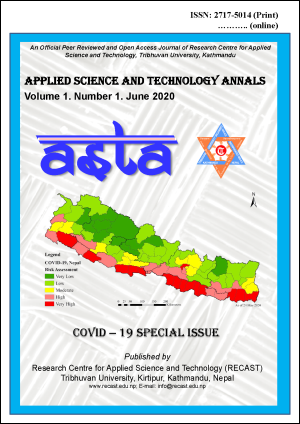COVID-19 pandemic: opportunities and challenges for microbiologists in Nepal
DOI:
https://doi.org/10.3126/asta.v1i1.30306Keywords:
control, diagnosis, infectious disease, license, MicrobiologistsAbstract
Coronavirus disease-19 (COVID-19) has affected global population with high morbidity and mortality in short period of time. After the report of first case of COVID-19 in 23 January 2020, it took almost two months for the report of other cases and since then cases are rising rapidly. The ongoing outbreak presents many public health management challenges due to limited understanding of risk factors for infection and transmission, pathogenesis and effective preventive measures, as well as limited options of laboratory diagnosis. Government of Nepal, Ministry of Health and Population has requested Tribhuvan University, Central Department of Microbiology to provide technical support to COVID-19 case diagnosis. Accordingly, till the date the department has technically supported to establish four diagnostic laboratories and trained laboratory personnel for detecting SARS-CoV-2 using Real Time PCR. In order to aware authorities, scientific community and general people, the faculties of the department disseminated updated knowledge on current pandemic through series of media interviews. However, due to lack of recognition as health worker for Microbiology graduates of the department, they could not participate in the routine diagnosis of patient in the laboratory. If granted the license, they can utilize their full potential for infectious disease control to support health sector. Therefore, it is essential to use microbiologist from Tribhuvan University for strengthening the laboratory capacity at Provincial, Municipal and National level to mitigate the present crisis of COVID -19 from Nepal.
Downloads
Downloads
Published
How to Cite
Issue
Section
License
© Research Centre for Applied Science and Technology (RECAST)

